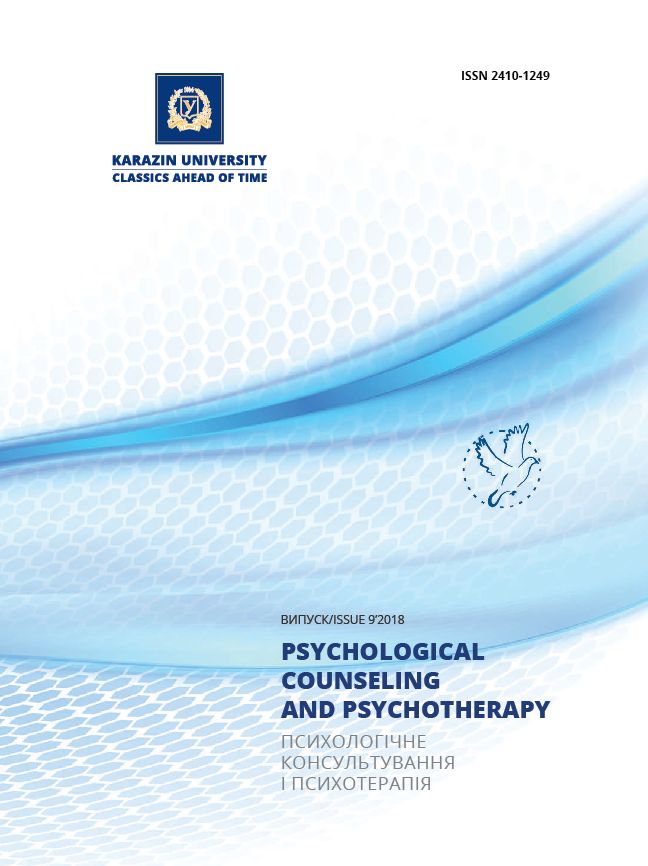PROCESS IN THE CLIENT-CENTERED PSYCHOTHERAPY
Abstract
The article considers the problem of the quality of the course of the psychotherapeutic process. It is shown that there are features of the client's mental organization that determine the effectiveness of therapy. An important parameter in assessing a client's resource is the presence of a qualitative metacognitive functioning in it, which includes: the authenticity and naturalness of the experience, as well as the reflection of the sources of these experiences. It is shown that the reflexive technique described by K. Rogers works exclusively on optimal processes, where there is an easy, natural transition between the different components of the emotional scheme: actual experience, a system of early memories, bodily manifestations, intellectual interpretations and motivation. If there is no such transition, a number of difficult phenomena of the process are observed. It can not be explained that the reflexive technique does not work solely with the client's unwillingness to change or the inadequate preparation of the therapist. It is necessary to supplement the strategy of "following" the client's strategy of "management", which will significantly improve the effectiveness of therapy. Following and conducting are two interconnected processes, only in unity they allow to actualize the organismic tendency. The author concludes: 1) it should be recognized that the "stopping" of the psychotherapeutic process can be caused not by the client's unreadiness, but by the way of organizing his psyche; 2) one of the options for conceptualizing such a "stalling" is a violation of metacognitive functioning, which includes the authenticity and naturalness of experiences, as well as an understanding of their sources; 3) successful metacognitive functioning is associated with the experience of safe attachments; 4) the process of "following" the client can be supplemented by the strategy of "leadership".
Downloads
References
Elliott R. Emotion-focused therapy // P. Sanders (ed.). / The tribes of the person-centred nation. - N.Y., 2003. – P. 103 – 130.
Villas M., Bouen B. Миф о недирективности: сеанс с Джилл [The myth of non-directivity: a session with Jill]. // Magazine of practical psychologist. – 1998. – no.1. – P. 21–31. (in Russian)
Burlachuk L.F., Kocharyan A.S., Zhidko M.E. Психотерапия: Учебник для вузов. 3-е изд. [Psihoterapiya: Manual for universities. 3-e ed.] Sankt Peterburg: Peter, 2012. – 496 p. (in Russian)
Hart J. The development of client-centered therapy / J. Hart, T. Tomlinson. // New Development in client-centered therapy/ J. Hart, T. Tomlinson. – Boston: Houghton-Mifflin, 1970. – P. 3-22.
Rogers K. Взгляд на психотерапию. Становление человека [A look at psychotherapy. Becoming a man] / Gen. ed. and introduction by Isenina E.I. Transl. from engl. – Moscow: Publishing group «Progress», Univers», 1994. – 480 p. (in Russian)
Senford R. От Роджерса к Глейку и от Глейки к Роджерсу / Карл Роджерс и его последователи: психотерапия на пороге XXI века [From Rogers to Gleyk and from Gleyk to Rogers / Rogers Carl and his followers. Psychotherapy on the threshold of the XXI century] / eds. D. Brezier; transl. from engl. – M. : Kogito-Center, 2005. – P. 271– 292. (in Russian)
Kocharyan A.S. Клиент-центрированная психотерапия как невербальная практика [Client-centered psychotherapy as a non-verbal practice] // Zhurnal prakticheskogo psihologa. – Moscow, 2012. – P. 121-130. (in Russian)
Warner M.S. Person-centred therapy at the difficult edge: a developmentally based model of fragile and dissociated process // Person-centred therapy today. / D. Mearns and B. Thorne (eds.). – London: Sage, 2013. – p. 144-171].
Mc Williams N. Психоаналитическая диагностика: Понимание структуры личности в клиническом процессе: Перев. от англ. [Psychoanalytic Diagnostics: Understanding the Structure of Personality in the Clinical Process: Trans. from English] / Nensi Mc Williams. – Moscow: Nezavisimaja firma «Klass», 1998. – 480 p. (in Russian)
Mearns D., Thorne B. Person-centred counselling in action. – London: Sage, 2008. – 242 p.
Greenberg L., Safran J. Emotion in Psychotherapy // American Psychologist. - January 1989. - Vol. 44, No. 1 – P. 19 29.
Jandlin Yu. Фокусирование: Новый психотерапевтический метод работы с переживанием [Focusing: New psychotherapeutic method of working with experiences] / Jandlin Yu.; Trans. from English A. S. Rigin – Moscow: Nezavisimaja firma «Klass», 2000. – 448 p. (in Russian)
Rice L.N. The evocative function of the therapist // D.A. Wexler and L.N. Rice (eds.). Innovations in Client-Centered Therapy. – N.Y.: John Wiley & Sons, 1974. – p. 289-311.
Wexler D.A. A cognitive theory of experiencing, self-actualization and therapeutic process // D.A. Wexler and L.N. Rice (eds.). Innovations in Client-Centered Therapy. – N.Y.: John Wiley & Sons, 1974. – p. 49-115.
Kocharyan A.S. Переживание как мишенью психотерапии [Experiencing as a psychotherapy target] // Har'kov: Izd-vo Har'kovskogo nacional'nogo universiteta imeni V.N. Karazina, 2014. С. 17-29. (in Russian)
Main M. Metacognitive knowledge, metacognitive monitoring, and singular (coherent) vs multiple (incoherent) models of attachment // C.M. Parkes, J.S. Hinde and D. Marris (eds.)/ Attachment Across the Life Cycle. – London: Travistock/Routlege, 1991. – p. 127-159.








